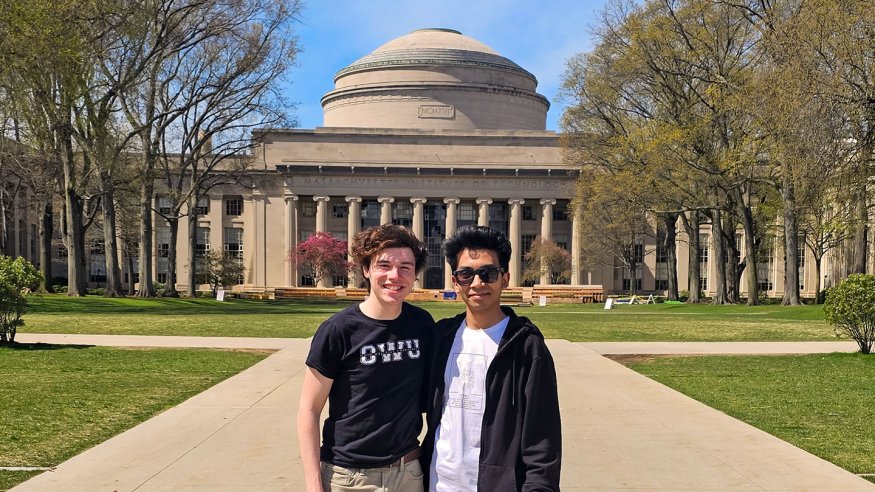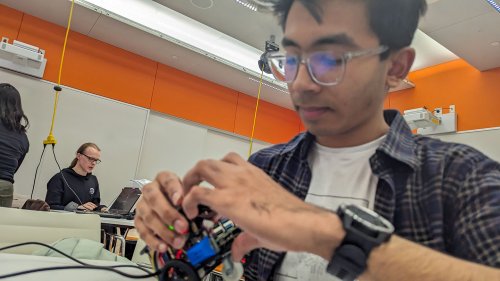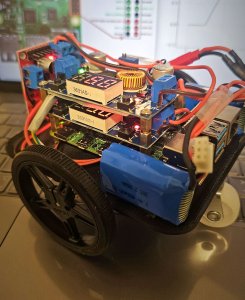
Bot Builders
Ohio Wesleyan Students Create Robot, Compete in Annual Harvard Competition

Name: Wasif Karim '26
Hometown: Dhaka, Bangladesh
Majors: Astrophysics (Bachelor of Science) and Computer Science (Bachelor of Arts)
OWU Connection Experience: Attending the Harvard PacBot Competition 2024 held April 27 at the Harvard Science Center in Boston, Massachusetts
Karim and C.J. Delaney '26, an Astrophysics major from Hiram, Ohio, each earned an OWU Connection Small Program Grant to support their attendance at the competition, hosted annually by the Harvard Undergraduate Robotics Club.
This project not only focused on applying and enhancing our skills in robotics, engineering, and programming, but also emphasized teamwork, innovation, and strategic problem-solving.
"This project not only focused on applying and enhancing our skills in robotics, engineering, and programming, but also emphasized teamwork, innovation, and strategic problem-solving," Karim said. "It offered a platform for us to compete with peers from various universities, showcasing our technical abilities and learning from the diverse approaches of other teams."
Our Bot

"The competition focused on building a smart car, measuring 7 inches by 7 inches by 7 inches, capable of navigating and solving a maze, making decisions using A* algorithm, choosing the shortest path, and avoiding obstacles and ghosts.
"The bot had a 3D-printed frame, an encoder-connected gear motor for precise movements. Our bot was constructed using a Raspberry Pi (a credit-card-sized computer), an Arduino, and Adafruit sensors.
"The bot utilized a gyro sensor for direction, and the distance sensors to measure proximity to walls. These sensors, connected to the Arduino, collected data for navigating the maze. … The Raspberry Pi processed the data to determine the shortest and safest path, while also avoiding 'ghosts' and physical hazards."
Training Session
"The day before the competition, we had a training session from 8 p.m. to 12 a.m. at Harvard. We collaborated with a team from Princeton University who had participated in the competition for three years. We also had the privilege of meeting Daniel Dickman, president of the Harvard University Robotics Club, who gave us a tour of their facilities and shared insights."
Competition Day
"The competition started at 9 a.m. Initially, we faced challenges connecting our bot to Harvard's server. Other teams from universities such as Princeton, Rochester, Tufts, and several Canadian institutions participated. Given our inexperience, we encountered numerous bugs and issues, especially with last-minute changes to the game model. Despite the setbacks, the competition was a valuable learning experience."
'Incredible Learning Opportunity'
"The competition was an incredible learning opportunity, providing insights into problem-solving, creative thinking, and innovation. We also toured Harvard and MIT, experiencing their academic environments firsthand. ... Although we didn't win, the lessons learned were invaluable."
My Campus Involvements
Founder and president of the OWU Robotics Club, member of Phi Delta Theta Fraternity, StAP intern for Career Connection and programming intern for the Office of Residential Life.
Why I Chose Ohio Wesleyan?
"I chose Ohio Wesleyan University for several compelling reasons. Primarily, the University boasts strong Physics and Computer Science departments, providing a robust foundation for my academic interests. As a liberal arts college, Ohio Wesleyan offers the flexibility to pursue a double major, allowing me to explore both fields comprehensively.
"Additionally, the smaller size of the University facilitates a closer and more personal interaction with both peers and professors. This intimate academic environment is conducive to receiving personalized attention and support from instructors, which I believe is crucial for my educational growth and success."
My Plans After Graduation
"After graduation, I plan to join a robotics technology company to gain real-world experience and address practical challenges in the field. Following this, I aim to pursue a Ph.D. in rocket science and robotics, focusing on applications in outer space and the upper atmosphere."
